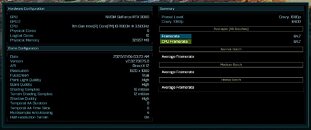Thursday, December 3rd 2020

Intel Core i9-11900K "Rocket Lake" AotS Benchmark Numbers Surface
An alleged Ashes of the Singularity (AotS) benchmark results page for the top 11th Gen Core "Rocket Lake" processor leaked to the web courtesy TUM_APISAK. It's official now that Intel will keep its lengthy processor model number schemes, with the top part being the Core i9-11900K, a successor to the i9-10900K. It also confirms that the "Rocket Lake" silicon caps out at 8-core/16-thread, with performance on virtue of the IPC gains from the new "Cypress Cove" CPU cores."Cypress Cove" is believed to be a back-port of "Willow Cove" to the 14 nm silicon fabrication process that "Rocket Lake-S" is built on.
The screenshot also confirms the nominal clocks (base frequency) of the i9-11900K to be 3.50 GHz, as Intel tends to put base frequency in the name-string of its processors. Paired with a GeForce RTX 3080 and 32 GB of RAM, the i9-11900K-powered machine yielded 62.7 FPS CPU frame-rate at 1440p resolution, and 64.7 FPS CPU frame-rate at 1080p (a mere 3.18% drop in frame-rates from the increase in resolution). These numbers put the i9-11900K in the same league as the Ryzen 7 5800X in CPU frame-rates tested under similar conditions.
Sources:
TUM_APISAK (Twitter), 1440p Results, 1080p Results
The screenshot also confirms the nominal clocks (base frequency) of the i9-11900K to be 3.50 GHz, as Intel tends to put base frequency in the name-string of its processors. Paired with a GeForce RTX 3080 and 32 GB of RAM, the i9-11900K-powered machine yielded 62.7 FPS CPU frame-rate at 1440p resolution, and 64.7 FPS CPU frame-rate at 1080p (a mere 3.18% drop in frame-rates from the increase in resolution). These numbers put the i9-11900K in the same league as the Ryzen 7 5800X in CPU frame-rates tested under similar conditions.


52 Comments on Intel Core i9-11900K "Rocket Lake" AotS Benchmark Numbers Surface
So glad I don't need a CPU upgrade before 2022+
Can't wait to see Intel vs AMD in 2022 when Intel launches brand new arch on 10nm or less
And we all know that Intel 10nm is equal to TSMC 7nm in terms of density, but 7nm sounds better right :laugh:
Just like GloFo 12nm was a terrible node compared to Intel 14nm. GloFo 12nm is more like 16nm or even worse, in terms of density